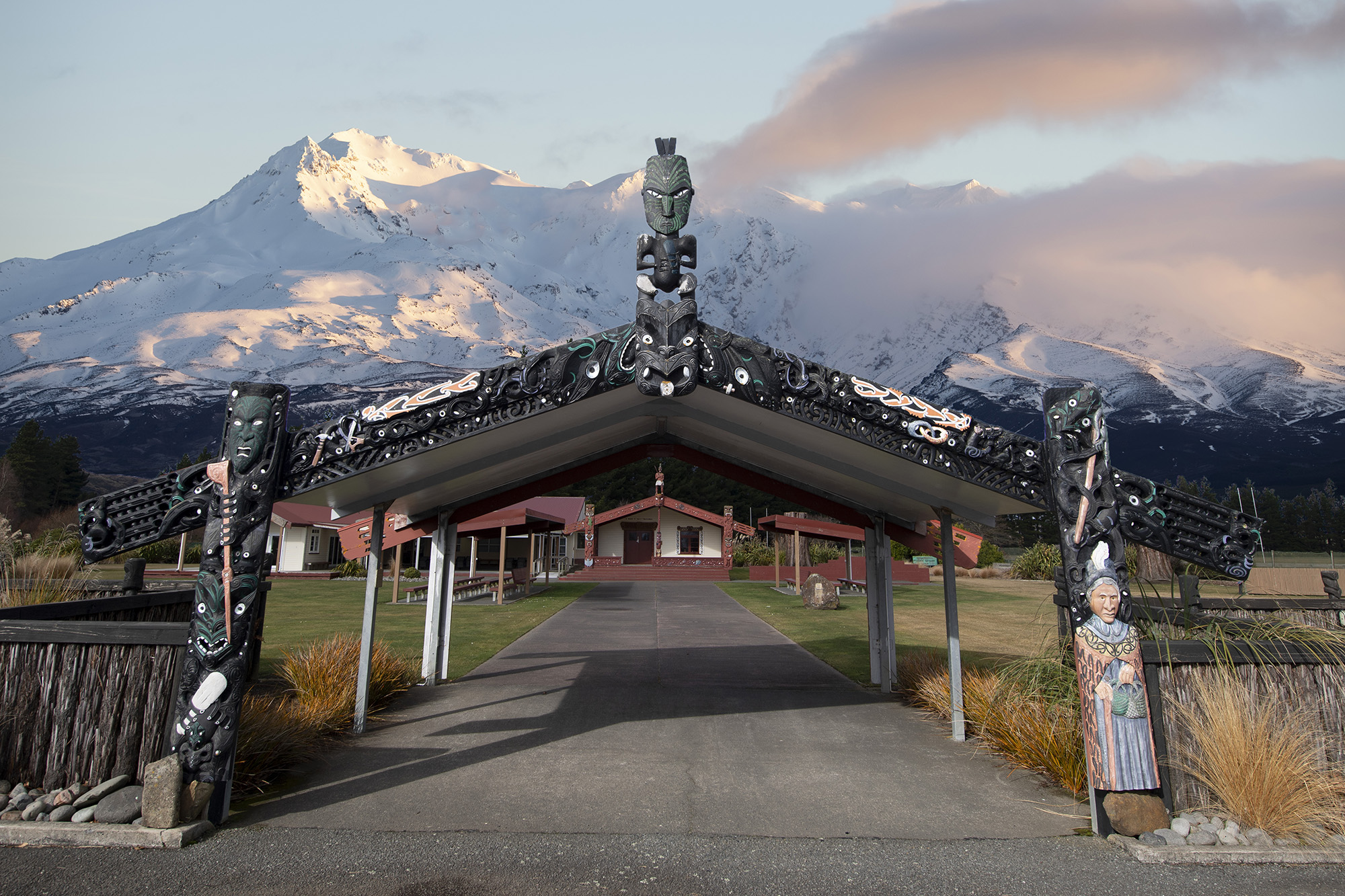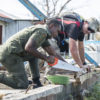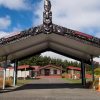I would like to start by stating what a privilege and honour it was to serve as the 14th Sergeant Major Army (SMA). There was no way when I started life as a soldier that I ever thought I would be in the running, let alone selected, for this prestigious appointment. I have enjoyed some great leaders and team-mates along the way. We remember those who have gone before us and those that have fallen. We put one foot in front of the other, learn fast, take opportunities and do our best. You can be all that you want to be if you dare to try.
Nga mihi – Good soldiering
What was your career pathway to reach SMA?
I’ve had a fairly traditional pathway from Unit Regiment Sergeant Major through to Command Sergeant Major Training and Doctrine (New Zealand) and Land Command Sergeant Major. Prior to that (and not so traditional back then) I had the fortune to work within Army General Staff which gave me some insight to the workings at the strategic level. I think now and into the future, it is important to have an NZDF or Joint experience earlier in your career pathway in order to have greater situational awareness but still master soldiering as your primary role within Army.
What advice would you have for soldiers aspiring to be SMA?
I would offer five aspects to be a successful Non-Commissioned Officer (NCO) and these are the foundations when aspiring to be the SMA. Leadership – is critical to the Army profession and good Non-Commissioned Officers (NCOs) are not just born – they are groomed and grown through experience, hard work and example from our seniors. To lead well you also need to be able to follow. Being a good team member is just as important when you’re in Army’s senior leadership team as it is when you are in a section or on a course. Think team, mate and self in that order.
Being a credible and competent professional – soldiers provide the foundation to unit readiness and it is important that self-readiness is maintained at all times. It is essential to have NCOs that are confident, competent and credible when it comes to leading our soldiers and training our Army.
Effective communicating – in the past, information was power, however, times have changed and now sharing is power. Having the ability to effectively communicate at all levels is critical to any leader’s profile. There are so many different communication platforms available these days and it is important to be open to untraditional methods of communication as they can often be the most effective. An important part of communication is also being able to listen. You can learn a lot about tempo, morale and general ongoings by just sitting back and listening to others.
Your character is everything – show respect, gain trust, be a good person. Stay true to yourself and retain your integrity. So many people let themselves and us all down with lapses in behaviour. If you expect to lead and soldier, then you have to be trustworthy.
Lastly but by no means the least important – have a plan – take ownership of your own career. We all have different reasons for joining the Army and in my case, it was because I was seeking adventure, the outdoors, being in a team and doing something worthwhile. But at the end of the day, you are responsible for your own career, where it goes and how you need to grow as a person. Now when I talk about making a plan, I am not talking about just filling out your PDR. I am talking about your plan that includes your family, finances, your personal goals, your own professional military educational needs and progression goals. Sometimes things don’t always go to plan but it will give you a firm base from which to seize opportunities that come your way. Real growth comes from new experiences and lifelong learning.
What was the one thing you worked hard to achieve during your time as SMA?
On a personal level, I tried to connect with our people through being available and listening more. Sometimes it’s good to say less and listen to different perspectives and ‘back stories’. This helps to crystallise ‘ground truth’ at the point of decision. For the organisation, leading and professional development were my main efforts. I tried to bring our soldiers, at every level, closer to reaching their true potential, largely through education and experiences. It is the most satisfying aspect as a leader to help and witness your people growing.
Do you have any regrets during your time as SMA? If so, what were they and what would you have done differently?
Generally I don’t have regrets, but if pushed I think it would be reflecting on whether I did enough and/or pushed as hard as necessary in certain areas. When you start a tour of duty you need to do a quick assessment and then set a plan, with one or two things that you particularly want to achieve. In a leadership team, discuss the plan with the boss and then get on with the work. Time will go quickly and before you know it, the next posting notice will arrive. Accept that you won’t get it all done, but without a plan and focus, you will achieve very little.
You did a lot of engagement internationally with SMAs from our coalition partners. Why is it so important for NZ Army to have a representative at these engagements and what do we bring to the party?
We need to be at the table and in the arena with our partners so that we are playing our part as a global citizen in maintaining international rules-based order. I felt very privileged to be representing our Army and NZDF on the international stage, as well as the responsibility to uphold our solid reputation. I have seen and felt first hand the genuine appreciation and respect that our partners have for New Zealanders and the NZDF. They value our honesty; our ability to build relationships; and our unique perspective from a multicultural society and a professional force. We produce very good commanders and soldiers who display initiative, leadership and positive outlooks down to the lowest levels. It is also a good opportunity to discuss and confront common issues within our organisations. It does not matter if you are an army of 85,000 or 5,000 soldiers; we all have similar issues with operations, training, personnel and resources. Look past the scale and you’ll find that soldiering is a global profession.
In your opinion, how is soldiering changing?
I think the opportunities available nowadays are greater in terms of career choices. You can choose various streams within trades, change corps, come in or join the Reserves, or even leave Army and come back with increased ease. In terms of the Profession of Arms, I think the change is in the complexity of conflict and cross-over in domains of maritime, land, air, not to mention sub-surface and space. This places greater and more diverse demands on our people. As much as fundamental soldiering remains important and critical to what we do, we need the agility to operate in different environments, to adapt our structures and skill sets, and above all, train and educate our people accordingly to remain relevant.
Were there any situations during your time as SMA when you needed to think on your feet, and required ingenuity and adaptability to get you through?
More often than not this occurred in the area of messaging, and the need to adapt to what I was sensing on the ground, or what needed to come from me or through me from CA. I can recall times going into a room or event with a prepared script and discarding it based on what I sensed or was hearing in the conversation and/or seeing in the body language. Equally, the message may have stayed the same but the delivery method and style need changing to have the effect. This happened overseas as well. This is the difference between connecting and just being on ‘send and receive’, and you need to be agile and adapt to the audience. On the lighter side, there have been plenty of ‘moments’ where I have had to adapt and overcome. I’m not known for my fine dining expertise (especially overseas) so in the early days I wouldn’t have a clue what was on the menu so I would let others order first or just listen to what our hosts were ordering. Even more so with wine as, just quietly, I couldn’t tell one white or red from another, and definitely didn’t (don’t) have the art of tasting down pat. I would smile, nod politely, and make some comment about how great New Zealand wine is. I would go on to have the privilege to attend dinners in some amazing company and little did they know I probably would have been more comfortable with a canteen cup talking with soldiers in a fighting pit!
How important is professional development for soldiering?
Crucial. It behoves each of us to be as good as we can be in our profession when we are entrusted with New Zealand’s sons and daughters as our teammates and subordinates. We need to cement our ethos and values, train to high standards in our tradecraft, pack in as many experiences as we can and educate ourselves through reading, problem solving, discussing and debating and importantly listening.Prepare, rehearse and make mistakes; fail, re-group and go again. We need to be ready in every sense –mind, body and soul.I believe that we need to rethink about why, how and what we do for professional military education (PME). Whilst I am not saying the system is broken, I recommend we refocus on why we do PME and how it makes us a better soldier/warrior/operator in what we do.
In 2012, General Dempsey from the US Army released a White Paper on PME stating the purpose of PME was to “develop leaders by conveying a broad body of professional knowledge and developing the habits of mind essential to our profession”, including intellectual curiosity, coupled with openness to new ideas. I have come across many soldiers who are curious, eager to learn, grow and share their own knowledge and experiences. I think we have a real opportunity to fully embrace PME in the NZ Army and grow it into something truly valuable.
What are you reading at the moment?
Actually I’m working through a couple of books right now. I have been looking at doing some study so have a book to help with doing research. I have just finished reading Army Fundamentals – a series of essays about our Army. Just started is Ghost Fleet, a fictional but heavily researched piece about future conflict. I don’t always have a book on the go, but I am constantly reading blogs, articles and listening to podcasts. As many of you know, I have truly embraced social media and there are a few blogs, e.g. “The Military Leader” and “The Strategy Bridge”, and podcasts, e.g. “The Dead Prussian” and “BBC Hardtalk”, that I find incredibly useful for professional development.
The role of SMA requires a lot of time away from home and working long hours. How important is it to have the real ‘General ’ of the household supporting you?
I have to be careful here because my family might pick this up and read it one day! Being partnered with a soldier is tough; being with this particular soldier is really tough because I seek to be professional always and I am passionate about what I do. The reality is that at times and in certain appointments, the Army will come first. That said, the serviceperson actually controls a lot of this and we can set ourselves up for success by discussing expectations with our partners. Good communication and having a plan is key. Your family will be there after you leave the military, and they will carry your name with them when you are gone.
The SMA workload and travel seems to be immense. How do you balance things out and maintain a healthy lifestyle?
This is a challenge that you get better at as time goes on. People would approach me saying, “I know you’re really busy but…”. Firstly, the SMA is no busier than anyone else; just a different sort of busy. You need to have a focus which helps you decide where you need to be versus where you want to be on any given day. A positive outlook goes a long way to being resilient and remaining flexible with the plan and needs of others. In terms of lifestyle, there has to be a balance in exercise, sleep, nutrition and relaxation. Easy to say; it takes discipline to achieve but it makes you an effective leader and better person.Who has been your role model?I don’t have one particular role model per se. I tend to take the best out of others (juniors, peers and seniors), and try to incorporate that into how I operate whilst remaining authentic. As much as we look to others for examples and strengths, we need to constantly work to lead and know ourselves. Character is ‘who you really are’ and plays a big part in the trust you receive as a leader and team member.
Lastly, the NZ Army loves a good quote – what is the most memorable quote for you?
I’ll offer a quote and a whakatauki (proverb) to support the themes of my responses.“The most important six inches on the battlefield is between your ears” – US Secretary of Defence, General USMC (Rtd) James Mattis.Secretary Mattis is a huge proponent of studying the Profession of Arms, of doing everything in your capability to be prepared for the next mission. The ability to think quickly, apply judgement and act are as important now as they’ve ever been to soldiering at all levels. The ability to get it more right, more often than not, means you need to exercise the mind as well as the body.
“Ma te tuakana ka mohio te teina; ma te teina ka mohio te tuakana.”“With guidance our young will learn from their elders; With patience our elders will learn from their young.”
Take care of your soldiers. Get to know their story and what matters to them. Offer guidance in less measure than the time you spend listening to them. Once you connect, demonstrate competence and show good character, they will follow you anywhere. They deserve the very best leadership and service.






